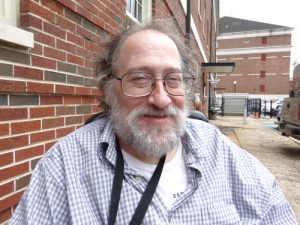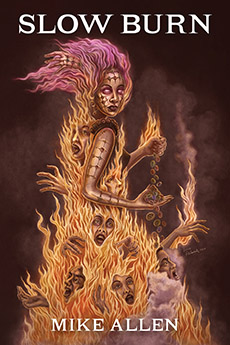Featured Poem II • December 2017
Signs
David C. Kopaska-Merkel
Some of us have seen the burning footprints going north on Clark St., turning west onto 6th Ave. They just ended, like the Maker jumped into Sunday’s mackerel sky; tell me that’s not proof of something. Or, just this morning, every bit of type on page 3 of the paper, Page 3! was the letter “W”, arranged so as to depict, if you held it just a bit past arm’s length, the face of a woman with a wild stare. Some will say both of those events could have been pranks, but get this, just this morning I was awakened by a flock of geese, honking so loudly the whole house shook, I stuck my head out the window; there were thousands of them, they covered the sky, all moving west. Then I noticed the backyard was moving too, it looked tempest-tossed, it was full of mice, shrews, voles (not sure about them), crickets, grasshoppers, all manner of small beasts, all moving west. Someone’s trying to tell us something. Look to the east if you don’t believe me, but don’t come looking for me, I’ll be gone. Don’t need to tell me 4 times!
 David C. Kopaska-Merkel has been writing science fiction and fantasy since rock was young. He joined the Science Fiction and Fantasy Poetry Association (SFPA) in 1986, edited Star*Line in the late ’90s, and later served as SFPA president. Many of his poems have received Rhysling nominations, and he won the Rhysling award for best long poem in 2006 for “The Tin Men,” a collaboration with Kendall Evans. He was voted SFPA grand master in 2017. His poetry has been published in scores of venues, including Asimov’s, Strange Horizons, and Night Cry. A recent book, Footprints in Stone, is a nonfiction collaboration with Ron Buta. He edits and publishes Dreams and Nightmares, a genre poetry zine in its 31st year of publication. Blog at http://dreamsandnightmaresmagazine.blogspot.com/ featuring a daily poem. @DavidKM on Twitter. He lives in a centuried farmhouse that has been engulfed, but not digested, by a city.
David C. Kopaska-Merkel has been writing science fiction and fantasy since rock was young. He joined the Science Fiction and Fantasy Poetry Association (SFPA) in 1986, edited Star*Line in the late ’90s, and later served as SFPA president. Many of his poems have received Rhysling nominations, and he won the Rhysling award for best long poem in 2006 for “The Tin Men,” a collaboration with Kendall Evans. He was voted SFPA grand master in 2017. His poetry has been published in scores of venues, including Asimov’s, Strange Horizons, and Night Cry. A recent book, Footprints in Stone, is a nonfiction collaboration with Ron Buta. He edits and publishes Dreams and Nightmares, a genre poetry zine in its 31st year of publication. Blog at http://dreamsandnightmaresmagazine.blogspot.com/ featuring a daily poem. @DavidKM on Twitter. He lives in a centuried farmhouse that has been engulfed, but not digested, by a city.
About this poem, he wrote, “I write a lot of poems about god(s), perhaps because I don’t believe in them. ‘Signs’ is about a god who sends messages that are slightly more easy to understand than those people think they receive IRL. There is still some interpretation required.”
![]()
If you’ve enjoyed what you’ve read, please consider pitching in to keep us going. Your donation goes toward future content.
![]()















